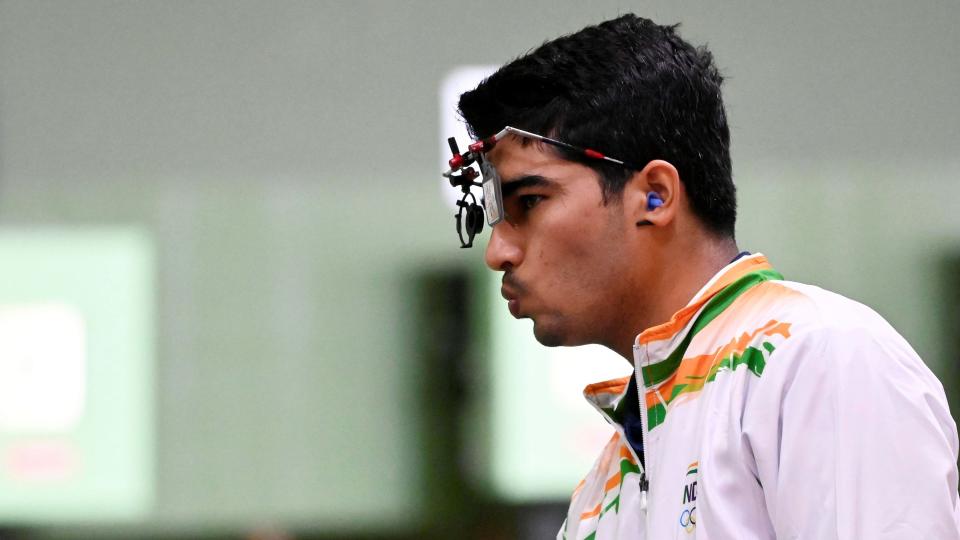Indian Shooters' Performance Highlights Importance of Mental Health

Manu Bhaker and Saurabh Chaudhary, who had together won five World Cup golds, finished 7th in the 10m air pistol event for which they went in as favourites.
It was the pair's first Olympics, but the expectations were high. That they had skill and talent had been established with their past performances, but did they have the right guidance at the vital moments?
While experienced coach Ronak Pandit was present as the team's pistol coach, the Indian shooting team in Tokyo had no sports psychologist travelling with them. Was that a detrimental factor, specially with so many Olympic debutants in the 15-member squad?
Divya Jain, a sports psychologist who has worked with Indian Olympians, threw some light on how results in precision sports like archery and shooting can be affected by mental strength.

Tokyo Olympics: Manu Bhaker and Saurabh Chaudhary failed to qualify for the 10m Air Pistol Mixed Team finals.
Did The Duo Succumb to Pressure?
“There is a strong mental aspect in every game. But when it comes to precision sports, pressure can have a more significant impact. In other sports, the level of the strength can often be channelized. For instance, you can sprint faster or devote more energy (on the field). However, in precision sports, you must keep your heart rate down and be steady. So, games like shooting and archery are very mental-heavy games,” Divya Jain told The Quint.
In an event like the Olympics, which grabs more eyeballs, the pressure is bound to increase. Despite being just 19, both Saurabh and Manu had experienced immense success on the shooting arena over the last few years, winning multiple World Cup gold medals in the mixed team event, in which they finished seventh in Tokyo.
So while skill and talent is clearly not lacking in the duo, could it have been the pressure of performing on the biggest stage that hampered their outing in Tokyo, specially with no mental conditioning coach at hand to consult between rough days on the course.
“Definitely, you can use your mental skills between games during the tournament. There are two parts to this. Firstly, something which isn’t in your control might happen and it will happen in sports. Sport is about being able to overcome the adversities. There is a lot of conversation around tough draws, but in the Olympics, every game is exciting, and you are there because you belong. When there is a lot of conversation around uncontrollable factors, the pressure tends to mount. Players need to look at their own performance, not through the lens of an outcome but comparing it with your previous performance,” Divya said on the matter.
“You have to prepare for every possible contingency that can come in your way and understand how stress impacts you,” the experienced psychologist added.
Also Read: 'Proud of You!' Twitter Celebrates 19-Year-Old Manu & Saurabh Despite Defeat
Psychologist's Help Like a Trainer's, Need a Long Term Relationship
Jain explained how every athlete should train with a psychologist and not just before big events. The relationship between a sportsperson and their psychologist is something they work and build on over time.
“Every athlete should have a sports psychologist working with him/her. But travelling can be an issue due to the logistical barriers. Introducing a psychologist, a couple of months before the games can help a bit but it’s not ideal. It’s like introducing a strength and conditioning coach a month before the tournament. It’s a long-term process. I often give this analogy to athletes about how you start the gym with lower weights but later, your capacity increases. It’s a process and mental training is just like it,” she said.
Also Read: Day 4, Tokyo: 8 Indian Shooters Fail to Go Past Qualifiers in Mixed Team Events
'Routines Need to Remain Same'
Divya pointed out how the routines might differ according to the result of the previous match. However, she suggested that neither a victory nor a loss should impact an athlete after a certain point. Athletes competing in multiple events or in a single event with many matches, should learn to “cut off from the result and move on to the next match.”
“A lot of times what we notice is the routine changes according to the result. So, after a victory, a player might be more outgoing, outspoken, and spend some time on social media. An athlete will relax and do things which you enjoy. On the other hand, in case of a loss they may think about the game a lot more than a win. Neither of these outcomes, shouldn’t affect an athlete beyond a certain point. If your routine remains the same irrespective of the result, it will take the pressure off winning or losing. If players can cut off from one match and move to the next one. You should look to learn from the tournament and move to the next match.”
Teams or athletes dominating in the build-up to a mega event and then producing a below-par performance isn’t quite uncommon in Indian sports. In the Rio 2016 Olympics, Jitu Rai was one of the favourites to win a medal but returned empty-handed.
In the aftermath of a below-par performance, the most sought after strategy of the administrators in poorly handled sports associations (that is all sports associations in India) remains the sacking of coaches. The mental aspect of an athlete isn't taken seriously and hitherto we might have paid the price for it. Hence, including a mental conditioning coach in the support staff must be the way forward for all Indian sports.
. Read more on Olympic Sports by The Quint.Indian Shooters' Performance Highlights Importance of Mental HealthDay 5 Tokyo Olympics, LIVE: Sindhu In Knockouts, Archer Jadhav Stuns World No.2 . Read more on Olympic Sports by The Quint.

 Yahoo Finance
Yahoo Finance 